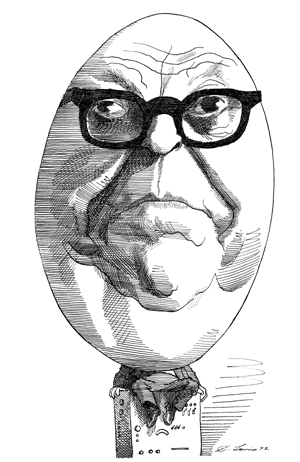The principal public statements of Lord Snow between 1959 and the present are collected in this book of lectures and essays: “Two Cultures,” only too well known, and “Science and Government,” which is about science in war time, are among them. He is concerned with the relation of science and technology to political decisions, and particularly to the decisions that will determine whether famine sweeps across half the world and whether overpopulation becomes a catastrophe.
There is another theme. Lord Snow is excited by power: not by the outward and superficial marks of it, but by the realities of decision behind the scenes. The excitement sometimes takes extravagantly romantic, even novelettish, forms, as when, writing about Sir Henry Tizard, he suddenly remarks: “Like nearly all successful men of affairs, he was in a muscular sense strong,” a vision of Whitehall supermen running up from the Athenaeum gym while weedy intellectuals wilt by the bar.
Whatever their musculature, leading scientists must become men of affairs if rational plans for the survival of the species are to be made. Lord Snow knows all about this intersection of roles from direct experience. He also knows that the topic is beset by clichés and gloomy truisms: he believes repetition of them to be a duty. It may already be too late to avert the starvation that uncontrolled growth in population will bring.
There is one alleged truism, repeated here, which seems only a half-truth; and it has important implications. Lord Snow writes:
The only weapon we have to oppose the bad effects of technology is technology itself. There is no other. We can’t retreat into a non-technological Eden which never existed.
Surely the bad effects of technology can be, and have been, opposed by something other than technology itself: by those literary intimations of disgust which have had their slow influence upon opinions and policies of resistance. Lord Snow mentions Ruskin and Morris dismissively, as the authors of mere “screams” of protest; and he calls literary intellectuals who protest against advances in technology “Luddites.” He recognizes that many of the great figures in the modern movement in literature have been hostile to technological improvement and to the habits of mind that sustain it. I doubt whether this hostility was just ignorance and illusion. In part it was an insight into human needs, and a perception of the unbearable ugliness and deformities which industrial technology, uncontrolled, would bring; perhaps also an intuition of a future deterioration and despair, because of the spoiling of nature.
All this has to be set against the established misery of the long agricultural centuries before. But Lord Snow underrates, I think, the strength of Ruskin’s and Morris’s case against the displacement of individual feeling which Victorian technology caused. He attributes fastidious distrust of technology to literary intellectuals, a well-fed minority; but the desire to get away from the effects of modern technology was, and is, fairly widespread and very strong, and not confined to the leisurely few. The pastoral dream, the dream of bygone crafts, the dream of traditional quietness is evident in houses and gardens everywhere in Britain; and modern ugliness is often felt as an insult and a humiliation by those who can least easily escape from it.
Nor is the distrust of accelerating technology always unrealistic. Certainly starvation can be mitigated and prevented only by technology, and the Green Revolution, the improvement of crop yields, is a triumphant technology. But it does not follow that the application of technologies without limit ought not to be obstructed; for different technologies destroy one another, each feeding on scarce skills and capital resources, and the more innocent and useful often, perhaps usually, go to the wall.
For example, the technologies that support fast transport, space exploration, consumer’s choice in food, in entertainment, and in fashion may supplant or obstruct the technologies that would otherwise support efficient public health services, the spread of literacy, and a better diet at the bottom of the scale. Probably the applied scientific skills that support marginal improvements at the top end of the scale of living standards are generally more interesting intellectually, more novel, and more closely linked with the advanced sciences. Therefore in a free market they will be more eagerly pursued.
So faith in technology may result in ever better methods in Massachusetts General Hospital and ever greater medical poverty in outlying places which lose their few remaining doctors to the centers where progress is made. Or, more frivolously, the journey from London to New York becomes shorter and shorter, and from Oxford to Cambridge longer and longer, until, after a few more years of “advance,” the first will be shorter than the second. The superhighway and airport come near the village just as the train and bus services are phased out. The older technologies had their corresponding social forms; as they are replaced by the new, those who live at the bottom of the scale of opportunity are left out of the social progress.
Advertisement
Lord Snow is writing from the standpoint of an independent sage of the second, and scientific, enlightenment. He does not analyze in political terms the possibility of planning priorities in technological improvement. The most difficult questions are, therefore, and reasonably, not raised. We have no grounds for believing that enough governments will have a motive to plan priorities, and to concert action among themselves, in good time; and we do not know what kind of institutions to allocate priorities would be politically possible and effective if governments should be moved to act. The idea of planning the priorities that will determine the survival, and mode of life, of whole populations implies terrible concentrations of power. How is this to be mitigated?
Suspicion of advanced technologies may be a step toward thinking cautiously of priorities. Whenever there is an actual pretechnological Eden, it is probably rational to take the short view and to defend Eden against progress unless it is demonstrable that the progress will be enjoyed by the visible children of those who are alive there now and not only in the remote future. Just as much modern architecture is fun for the architects but leaves the mere users depressed, so much very advanced technology is fun for the technologists and its few beneficiaries but leaves the world’s villagers just where they were before. As a social scientist, Ludd was inclined to over-simplify; but we still do not have an adequate social theory to put in the place of his.
In Professor Gabor’s thoughts about science and the social future there is a crisp provision for leisure, lifelong education, nonconformity alongside rational planning. A Nobel prize winning physicist, he is admirably clear about the preservation of liberty and the vagaries of individuals. But there are two vast voids in his argument which leave me with a sense of unreality as I try to envisage his projected future as one possibility among others. First, he gives almost no attention either to the political processes, or to the political institutions, that might be involved in bringing about the social changes that he thinks necessary. He does not ask the two unavoidable questions: what class, or group, of persons would have an interest in carrying through the required social changes? Second, what checks and balances might prevent the political planners, however selected, from abusing their powers unbearably?
The second great void is to be found in the language that he uses, particularly when he speaks of “making” people interested in this or that by social pressures: the void is an absence of any psychological theory. How malleable are citizens’ interests? How much are their actual interests, and their satisfactions, to be explained as the effect of social pressures and of changing forms of society? Are their interests and emotional satisfactions more the effect of unknown genetic factors, and of intimate family histories, rather than of social pressures?
Because the answers are not known, nor even within the range of intelligent guessing, futurologists are apt to fall back on a simplified historical determinism to fill the gap, a watered-down Marxism. The old nineteenth-century theories linger on, even though the evidence does not support them. In fact, waves of violent crime, of nationalistic frenzy, phases of rampant dissent among the young followed by phases of unnatural docility, alternations of pacifism and chauvinism among voters succeed each other unpredicted and unexplained. They constantly surprise us, just as changes in fashions and styles surprise us.
Perhaps the metaphor of waves points in the right direction: as the waves break on the rocks, myriads of “small causes” determine the path and trajectory of the water, which still forms some gross recurring patterns, but with many variations. Computations in advance of such a wave’s path, involving the integration of so many minute interacting factors, may be humanly almost impossible: or it may be just impossible with our present, or with present foreseeable, means of computation. Perhaps when we predict future forms of social life we are presuming that we can integrate a myriad interacting minute causes, and this is presuming too much. The error, if it is one, is certainly dangerous. Demographers can rationally extrapolate some gross trends into the future, partly because the interactions between their minute causes are fewer and less complex, and partly also because their science is buttressed by the uniformity of physical law. For population planning a gross trend is useful. But social historians and social planners still cannot extrapolate except in gross outline: and a gross outline is often misleading or useless or worse, when the sufferings, and emotional satisfactions, of minorities are at issue.
Advertisement
This is another argument—the argument from uncertainty—for the short view in politics. If a government had eliminated present poverty and the present probability, and actuality, of war, and eliminated also the secret police, where they exist, it would have achieved the threefold good that we do know might possibly be achieved by political action. Add the immediate conservative aims of protecting living species, natural beauty, and any art and buildings that keep their vitality. Reconciling these aims, when they conflict, is work enough. All the rest is still the unknown science, and had better be kept away, at least for the time being, from experiments made from the center.
This Issue
September 21, 1972



